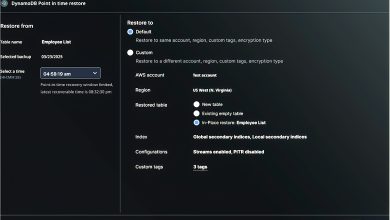World Backup Day: A Reminder to Protect Your Digital World

World Backup Day, established in 2011, is a global tech initiative that originated from a relatable experience. A user on Reddit shared their misfortune of losing a hard drive, lamenting the lack of a backup. This post resonated with Ismail Jadun, a digital consultant, who recognised the need for a day dedicated to reminding everyone about the importance of safeguarding their digital assets.
Jadun chose March 31st as World Backup Day, strategically placed just before April Fool’s Day. As he aptly stated, “Only fools would forget to back up their data.” This concept resonated with internet users and social media platforms, propelling the idea into an official global celebration.
Building Trust in Data
 As an individual, losing data can be an inconvenience or a painful reminder, but for an organisation, a data loss incident can be catastrophic. With data breaches, loss or theft becoming increasingly commonplace in today’s digital world, Remus Lim, Senior Vice President, Cloudera APJ, is of the opinion that World Backup Day is a timely reminder of the importance of data protection, both on a personal and enterprise level.
As an individual, losing data can be an inconvenience or a painful reminder, but for an organisation, a data loss incident can be catastrophic. With data breaches, loss or theft becoming increasingly commonplace in today’s digital world, Remus Lim, Senior Vice President, Cloudera APJ, is of the opinion that World Backup Day is a timely reminder of the importance of data protection, both on a personal and enterprise level.
Business continuity, preventing financial loss, legal compliance, and maintaining customer trust are some of the factors that make data protection imperative for enterprises. While it is common for enterprises to turn to data protection methods like data encryption and data backup, Remus believes that safeguarding data effectively requires a holistic strategy that includes policies and processes to address concepts like data governance.
“With many companies looking to leverage data-driven decision-making or technologies like Artificial Intelligence (AI), the need to have data that is highly available and easily accessible is critical, but being able to trust their data is just as important. Enterprises must ensure that they have data governance frameworks in place so that their data sets are accurate, complete, and consistent and in compliance with government regulations,” he said.
Remus added that data management may not be the first thing that comes to mind when speaking about data protection, but it is a very crucial aspect of securing data. Companies can experience numerous benefits by investing in modern data management platforms that deliver a real-time overview of data across multi-cloud and on-premises. “Such platforms allow them to actively monitor for threats while accelerating their AI and digital transformation initiatives through instantaneous access to high-quality data,” he explained.
Modernising Backup and Recovery Is Do-Or-Die for APAC Enterprises
 With data driving so much strategic business decision-making, Justin Chiah, Vice President and General Manager, Data Services and Storage, Asia Pacific, HPE, states that protecting organisational data is now a critical priority for APAC enterprises.
With data driving so much strategic business decision-making, Justin Chiah, Vice President and General Manager, Data Services and Storage, Asia Pacific, HPE, states that protecting organisational data is now a critical priority for APAC enterprises.
“Traditional backup and recovery solutions are increasingly struggling to comprehensively protect the rapidly growing data volume, especially in hybrid IT environments. Many organisations are facing growing complexities in managing backups across environments, with slow data recovery times affecting business continuity. Many backup solutions also do not offer adequate built-in ransomware protection capabilities to defend against highly advanced cybersecurity threats,” he warned.
Therefore, modernising data backup and recovery is now do-or-die for APAC organisations, especially with surging AI adoption driving exponential data growth. To build a robust, effective backup and recovery system, Justin shared that enterprises need a streamlined approach that consolidates backup and recovery operations in a unified management platform, which helps eliminate complexities and provide consistent protection to data, whether on-premises or in the cloud.
He continued, “Backup and recovery solutions should also come with built-in data security and ransomware protection via encrypted and immutable backups. Encryption ensures backup data is unreadable to attackers, while data immutability prevents backup data from being modified or deleted by threat actors. Enterprise customers are increasingly demanding cyber-resilient vaults that are both air-gapped and immutable because this approach optimises the accuracy of recovery points and the speed of application and business recovery.
Justin also touched on the growing importance of AI in supercharging backup and recovery processes. According to him, AI can automate data backups to ensure frequent and safe backups while making data recovery faster and more accurate. AI and machine learning can also improve the robustness of an organisation’s response to data loss incidents by helping to detect anomalies and identify potential security risks, such as identifying the point of infiltration of ransomware encryption.
Balancing Compliance and Data Protection
 Beyond self-preservation, data backup and recovery have become a regulatory tightrope walk for many organisations. On this, Nathan Hall, Vice President of Asia Pacific & Japan at Pure Storage, believes that organisations across the Asia Pacific region are struggling to align their backup and recovery processes with new regulatory standards that mandate swift restoration of services in critical industries.
Beyond self-preservation, data backup and recovery have become a regulatory tightrope walk for many organisations. On this, Nathan Hall, Vice President of Asia Pacific & Japan at Pure Storage, believes that organisations across the Asia Pacific region are struggling to align their backup and recovery processes with new regulatory standards that mandate swift restoration of services in critical industries.
“For instance, the Monetary Authority of Singapore requires banks to restore critical systems and services within four hours following an outage. This is difficult to achieve with legacy data storage solutions, which were never designed with fast recovery in mind. Apart from downtime, implementing advanced data protection capabilities to prevent data loss caused by ransomware attacks continues to be a challenge across all industries, resulting in both financial and reputational damage,” Nathan shared.
According to him, Pure Storage recommends a two-pronged approach to data protection: regularly creating immutable copies of data and adopting robust infrastructure to rapidly restore backups at speed and scale.
“A good practice is transitioning from traditional tape or disk-based backups – which are optimised for backup, but not recovery, and therefore have lengthy restoration times – to flash-based data storage solutions,” he said, adding that advanced flash-based storage solutions:
- Have failure rates 2-5 times less often than disk-based solutions.
- Can deliver recovery speeds of hundreds of terabytes per hour.
- Are able to restore ransomware-immune backups in a matter of minutes or hours at any scale.
This allows organisations to resume business operations immediately in the event of an outage.
Essential Backup Policies in the Digital Age
 What’s certain is that as companies persist in deploying and investing in new technologies like AI, the inevitable consequence is the continued generation and storage of vast amounts of data. Michael King, VP & GM, Asia Pacific and Japan at Wasabi Technologies, emphasises that safeguarding this data must take precedence. Echoing previous sentiments, he underscores that ensuring the availability and accessibility of this data isn’t just a choice; it’s an imperative for maintaining compliance and competitiveness.
What’s certain is that as companies persist in deploying and investing in new technologies like AI, the inevitable consequence is the continued generation and storage of vast amounts of data. Michael King, VP & GM, Asia Pacific and Japan at Wasabi Technologies, emphasises that safeguarding this data must take precedence. Echoing previous sentiments, he underscores that ensuring the availability and accessibility of this data isn’t just a choice; it’s an imperative for maintaining compliance and competitiveness.
To ensure this, Michael stresses the importance of comprehensive backup policies that include:
- Zero trust approach to cloud storage: This approach requires rigorous authentication and authorisation for all organisational members accessing sensitive data – encompassing strategies such as end-to-end encryption, two-factor authentication, and immutable buckets to limit user access. This creates a robust defence mechanism safeguarding the information from alternations and deletions of encryption attempts orchestrated by malicious actors.
- 3-2-1 and done: As simple as the 3-2-1 rule can be, transforming your data security strategy can be a huge undertaking. Instead, a backup strategy that is purpose-built for today’s digital climate should include immutability and speed of access, adhering to the 3-2-1-1-0 rule: Maintaining three copies of data on two different media, one off-site, one immutable copy, and zero for zero errors by making sure the air-gapped backups are fully functional. Replicating numerous copies of data isn’t conducive to efficiency; instead, businesses should adhere to an effective data management principle, especially considering the region’s tendency for overspending.
- Selecting cloud vendors prudently: Most cloud providers often charge an egress fee for data moved from their cloud back to on-premises, which is the case whenever a recovery occurs. Selecting cloud vendors that specialise in storage could allow businesses to experience immense benefits from cost-free access to data within seconds.
In today’s business environment, the looming threat of ransomware attacks and other cyber threats is ever-present – a reality potentially exacerbated by emerging technologies like AI. Given the inherent vulnerabilities of cloud platforms to such threats, business leaders face the imperative of assessing whether their current strategies adequately safeguard their data amidst the evolving digital landscape. Thus, while prioritising digital advancement is essential, it must not compromise data security and integrity. World Backup Day serves as a timely reminder of the critical importance of safeguarding digitally stored data.




